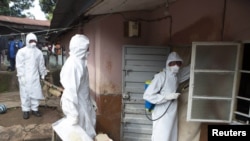The Press Union of Liberia (PUL) has urged the Liberian government to concentrate its energy on fighting the deadly Ebola virus outbreak and stop trying to prevent journalists from doing their work.
This comes as the Ministry of Health and Social Welfare has released a new media order requiring journalists wanting to photograph, conduct interviews or do video recordings at an Ebola health care facility to first get written permission from the health ministry.
Assistant Health Minister and head of the Ebola incident management team Tolbert Nyenswah told journalists the new media access policy aims to protect the privacy of patients and healthcare workers as well as the health and safety of Liberian and international journalists.
But PUL President Abdullai Kamara said the new policy shows the government is avoiding the real work it must do in mobilizing resources to fight the Ebola outbreak.
“We find it very offensive. There are two things we are noticing here. Firstly, the government functionaries probably don’t understand the context of free expression. They are actually working in contempt of the media, which is not in the best interest. It (the policy) doesn’t recognize the partnership that the media have been developing in fighting this Ebola virus in our country,” he said.
Assistant Health Minister Nyenswah said he would ask the ministry of information to enforce the new policy with both local and foreign journalists.
“We have noted with grave concerns that photographs have been taken in treatment centers while patients are going in and being attended to by doctors… That’s [invading] the privacy, the autonomy and respect and dignity of the patients,” Nyenswah reportedly said.
But Kamara said most of the Ebola-related news journalists are covering is not coming from health facilities.
“The truth is lots of people who are alleged to be suffering from the Ebola virus are not really in hospitals. So, does that mean the government has the capacity to stop people from going to different parts of the city to speak to alleged Ebola victims? These are a lot of sick people who are not in health facilities,” he said.
Kamara said the government is trying to fight the media as an enemy in different ways.
He also criticized the government’s new licensing guidelines for journalists announced September 30 this year.
Kamara said the ministry of information’s new licensing announcement is an attempt to roll “back efforts made by previous governments to make the media operating environment conducive.”
Kamara said while the most recent past governments of Liberia have allowed the Press Union to accredit journalists in Liberia, the Ministry of Information reversed that trend on September 30 when it announced that it will from now on take over the issuing of annual permits to journalists.
“For the last 10-15 years, successive governments have refused to implement the rule which requires the government to accredit journalists in our country. But as recent as last week, the government announced it is going to repeal the accreditation of journalists, and this only speaks to the fact that the government is fighting the media,” Kamara said.
In a statement issued following a weekend emergency meeting of media executives, the PUL said that by “bringing up these issues, the government has not only failed to implement domestic and international promises, but is now undermining the free press, censoring the media, and slipping into attitudes that led the country to more than 14 years of brutal civil war.”




